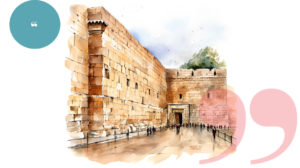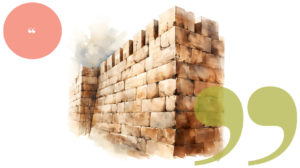I Pray Therefore I Believe
| October 18, 2013When Mordechai took up residence on a Hindu ashram in India, I closed my siddur, and raised my arms in surrender

The college classroom is abuzz with the most recent news. Shai Kramer, helicopter crash survivor, has been declared clinically dead by a panel of superior medical experts.
We debate the merits of additional prayer for Yeshaya ben Chana Aliza, considering his condition. You’d think we were a group of high school girls at best, or on-the-edge young adults at worst. Quite the contrary; we are a clan of sophisticated 35+-year-olds preparing to reenter the workforce and completing requisite graduate-level courses to that end.
The latest newsfeed, which already makes all the rounds before Professor Drew enters, is that they’re telling us there is no longer any point in praying — “they” being the fully accredited and licensed harbingers of anything newsworthy, and extremely close friends with Shai Kramer’s third cousins once removed. My iPhone tells me the news has been posted on all the Jewish news sites — the medical part of the news, that is. The medical headline is that the brain is dead, the heart almost so, and the body is being kept alive by a labyrinth of pipes, artificial pulses and pressures, and myriad medications. The religious implication is left for everyone to infer and gossip about until consensus is achieved … or not.
Not that I plan on praying — not at all. We don’t pray for public miracles. A prayer for Shai to awaken from the vortex of darkness and death that beckons is a prayer requesting a grand-scale miracle, the likes of which are few and far between, and even then not without a dubiously happy ending.
There is no reason for me to pray — none at all. The odds are stacked against Shai, and who do I think I am to imagine that I can intervene? Besides which, I don’t even know who Shai is! Does the tzadeikes who started the Tehillim chain-call early this morning really believe that my puny prayer for the restoration of a full quality life for a stranger named Shai can have any impact Up There? Can my prayer gather any momentum to effect the reversal of G-d’s Will? Seriously!
Yael tells me that when she went to daven at her father’s kever the other day, Shai’s family was praying at his grandfather’s tombstone. They were grateful to hear about the Tehillim chain-call.
Ronit swishes her midnight-dark, 20-inch ponytail and nods her head, birdlike, her eyes and mind flitting between all of us. Her body quivers to a standstill with a chirpy, “Ladies … English pleeeze? What’s a Tehillim chain call?” After cocking her head to the side and absorbing a detailed explanation, the flitting resumes. “You guys would really, like, sit down and pray for a total stranger? Too awesome [midnight ponytail flick], too awesome…”
Sari, jaded Sari, adds, “Yeah, but there’s no reason to pray. Didn’t they hear the doctors’ unanimous verdict? Living in denial, that’s what they are.”
Living in denial … that’s what I am. I don’t abstain from prayer because of Shai’s gloomy prognosis. I just … though I consider myself a frum Jew with all the accessories, including a full-blown chareidi name like Henny, somehow … I’ve just lost belief in the need for prayer. Or maybe I haven’t lost the actual belief, but I’ve certainly lost the feel of it.
Don’t get me wrong — I had an excellent upbringing and used to pray a lot. Then things just traveled along the easy road and my siddur collected dust together with the piles of laundry, planned menus, neglected shopping lists, and … Mordechai’s room.
Tell me, did Hashem hear me when I begged for Mordechai’s safe return from the street corners, from the local pubs, and from the drug hotspots across the Atlantic? Then I finally used my siddur well; my Tehillim, too. How I used them! I pleaded like a child, cried like a baby, and screamed like a wronged woman. But … nothing. Period. When Mordechai took up residence on a Hindu ashram in India, I closed my siddur, stuck the Tehillim behind Mordechai’s once-beloved set of Talmud Bavli, and raised my arms in surrender.
I know well the story of Rav Aryeh Levin telling a new widow that her tears for her infirm and eventually deceased husband had not been cried for naught; that every prayerful tear had been gathered by Hashem to use to mitigate harsh decrees. But I’m not a visionary … I want change now!
Prayer didn’t beget that change. Mordechai, spaced out in India, is proof of that.
Professor Drew sends a message that he’ll be delayed yet another 15 minutes. A Tehillim chain text illuminates my iPhone. “Please take a moment to daven for the refuah of HaBochur Yeshaya ben Chana Aliza, who remains in critical condition.”
Can’t they all leave me alone? I don’t want to pray. I haven’t connected to Hashem like that in ages. I came to college to advance my career in industrial psychology; not in religion.
Ding-dong! A pithy text message from a devout friend: “Dear recipient, maybe yours is the prayer Hashem is waiting for? Kapitlach 130, 20, and 119, l’refuas HaBochur Yeshaya ben Chana Aliza.”
Since when has Hashem asked me to pray? I thought He’d long forgotten there was once intimacy in our relationship … I certainly have. I mean, I go to shul three days a year, sometimes even more, now that so many of my children are grown. But … I do what I have to do … almost robotically … just to set a good example for my kids.
Eden recently told me the story of her famous soccer-player father and successful-singer mother’s return to Yiddishkeit 15 years ago. These traditional Moroccan parents of two neither scoffed nor praised Orthodox Judaism. Apathy ruled.
“Then my nine-year-old brother was assigned a day-school rabbi who encouraged hanging out in the local shul and praying. He said it was good Hebrew reading practice. After the boys got hooked on more than just the Hebrew reading, the rabbi would reward those who attended shul on Shabbos. My father thought synagogues were a farce. But Yakir … he very badly wanted to earn the reward.
“So one rainy Shabbos afternoon, Dad joined hands with Yakir for the trek to shul.
“Now, Dad’s native Arabic is no wonder in polyglot Kings Highway, New York. But his six-foot, two-inch frame, crowned with a mop-top ’60s hairstyle, certainly were a wonder in Congregation Shaarei Zion! Still, he was welcomed warmly and handed a small, peaked, white-satin yarmulke that he perched upon his mop-top like a perplexed exclamation mark.
“Something happened to Dad that day. The words of prayer wriggled into the gaping apathetic holes in his heart and seared him to his very soul. Thankfully, Mom was open-minded enough to follow suit — first mindlessly, then wholly devoutly.”
Why can’t this happen to me? My heart is shut tight, locked unto itself, even in the face of the caressing words of prayer.
Yael and Zara succumb. Tehillim in hand, they whisper words of supplication. Ronit undoes her ponytail, curtains her face, and, I assume, follows suit to the best of her paltry Hebrew-educated ability.
Look what they’re doing to me — a wisp of emotion has escaped from the angry fire of my soul. It rises, a smoking spire, towards my newly quavering heart, pumping blood-red desire through arteries, propelling my hands to my messenger bag to withdraw a little sefer hidden within the zippered privacy pocket.
A tefillah teacher once showed us the Rambam in Hilchos Avodah Zorah (11:13): “A person who whispers a spell over a wound, at the same time reciting verse from the Torah intending that verse to effect healing, and one who recites a Biblical verse over a child to save it from tragedy … are among those who destroy the Torah. They use words to try and cure the body. But words can only heal the spirit, as it is said, ‘They shall be life for your soul.’ (Mishlei 3:22)”
This, then, is my error — that I recite the words of Tehillim as though they are an online shopping order, clicked to my cart, charged to my card, and checked out with a request for rush delivery. But truly, they are a remedy — a shopping order and rush delivery for Divine connection.
I finger the pages of my Tehillim with ambivalent yearning. Finally, I search the kapitlach robotically, if only to fit in with the growing crowd of praying women. Sharon, the last one left with no Tehillim in front of her, eyes me askance and finally follows suit.
Kapitel 130 … Shir hamaalos. Shir? A song? No, this I cannot do.
Kapitel 20 … Lamnatzei’ach. To the composer? Am I the last person on earth who has forgotten to sing?
My mother used to sing all the time. She said song opened hearts to new vistas of faith and hope.
In a beautiful elucidation on the Nesivos Shalom (vol. 1, pp. 181–185), Rabbi Yitzchok Adlerstein explains that “a person cannot sing any kind of shirah with stunted, suppressed feelings, nor with a closed-up mind and heart. Shirah can only come from emotions whose restraints have loosened, so that they are developed and magnified.”
I reflect on the pain of Shai’s mother, not at all comparable to Mordechai’s defection, but still pain — the language I understand. That easily loosens my restraining grip on suppressed emotions.
Shir hamaalos, mima’amakim kerasicha Hashem.
The hymn feels strange; at once a supplication and statement of connection and dependence. I don’t know whether I am praying for Shai, for Mordechai, or for myself. All I know is that I am praying and gathering momentum, and well … something in my soul is singing.
Supplications are sometimes refused; songs of connection never so. I start to feel the belief again. It feels warm, protective, like I’ve relinquished control. Like I have to hand myself over to a Higher Being and trust that not everything is in my power, is my fault, is mine to fix. I’ve been touched … because I let down my guard and allowed myself to be touched — and to feel the touch.
The belief tastes like manna; warm and ready to represent any emotion — be it one of stronger union or of subjugation to His will. And I pray, just for the sake of feeling that belief, of feeling that prayer. Let G-d do with the prayer what He wills. I still pray, if only to bond …
Frantic text messages let me know that HaBochur Yeshaya ben Chana Aliza has returned his soul to G-d. The headlines omit the second half of the news … HaBochur Yeshaya ben Chana Aliza has returned G-d to my soul.
(Originally featured in Family First, Issue 308)
Oops! We could not locate your form.












